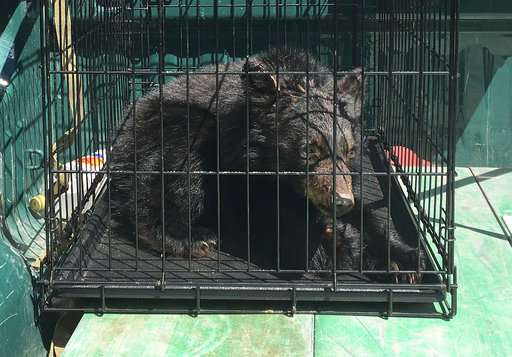This photo released Monday, April 24, 2017, by the Vermont Fish & Wildlife Department shows one of several bear cubs found the previous Monday starving in Guildhall, Vt., after a shortage of wild food supplies in parts of the state last fall. The cubs were sent to a bear rehabilitator in New Hampshire who will care for the cubs until they can be returned to the wild. (Mark Schichtle/Vermont Fish & Wildlife Department via AP)
Emaciated, nearly dead bear cubs are turning up more frequently in Vermont and New Hampshire, and experts are blaming an increase in births a year ago and a food shortage in the fall.
No one is sure what caused the shortage of acorns, beech nuts and other food favored by bears in the forests, but the end result is obvious: more people are calling wildlife experts after finding starving cubs under porches or in their yards.
Phoebe Kilham, who works with her brother Ben at a bear-rehabilitation center in Lyme, New Hampshire, is caring for six underfed yearling cubs. Many years they don't see a single starving cub.
"People don't really realize just how bad shape they are in," said Kilham. "You have to feel through the fur to feel the bones to realize they have nothing, no flesh."
She said that for every bear that's rescued, there are untold others in the woods.
The good news is that after a month or so of being fed and cared for the young bears can be returned to the woods, she said.
Mother bears will typically care for cubs for about 18 months. Cubs that have lost their mothers are more likely to need human assistance.
Kilham said that in addition to the six yearlings, born in the late winter or early spring of 2016, she is also caring for four cubs born this year. But those cubs were brought to her after their winter dens' were damaged and their mothers scared off, not because the young animals were starving.
Vermont Fish and Wildlife Program Manager Scott Darling said in a typical year, the state's wardens and biologists will find one starving cub. This year there are more, from one end of the state to the other, though he doesn't track the exact number.
Darling said it was possible more starving cubs will be found in the weeks ahead.
"As things green up, that will be a very significant in aid to nourishing bears, Darling said. "Until they do, particularly bear in higher elevations, there's very little for them to feed on."
In general, Vermont Fish and Wildlife urges the public to leave wild animals in the wild.
Darling said it's possible to rehabilitate bear cubs because there's less of a threat for disease transmission among captive bears, and Vermont has access to such a quality rehabilitation center in New Hampshire where many can be nursed back to health and returned to the wild.
© 2017 The Associated Press. All rights reserved.



















